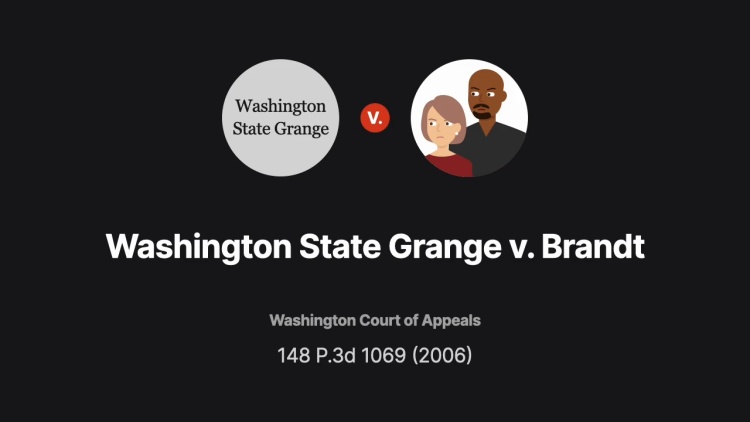Washington State Grange v. Brandt
Washington Court of Appeals
148 P.3d 1069 (2006)

- Written by Eric Cervone, LLM
Facts
In 1950, Raymond and Margaret Gorze conveyed land to the Orchard Grange. The 1950 deed stated that the land would revert “to the original plot” if it was no longer used for Grange purposes. In 1964, the Gorzes contracted with Robert and Myrna Brandt (defendants) for the sale of the remainder of the Gorzes’ property. The result was a 1984 deed to the Brandts for the Gorzes’ property. In 2004, the Orchard Grange dissolved, and the original 1950 parcel was no longer used for Grange purposes. Subsequently, the Orchard Grange’s interest passed to the Washington State Grange (WSG) (plaintiff). In 2005, the Brandts obtained a quitclaim deed from Margaret Gorze’s estate that purported to correct an error in the 1984 deed and convey the 1950 parcel to the Brandts. The Brandts then claimed that they acquired the Gorzes’ reversionary interest in the 1950 parcel. The WSG sued the Brandts to quiet title to the 1950 parcel. The trial court ruled that the 1950 deed’s reversionary clause was void due to the rule against perpetuities. Thus, the WSG owned the property in fee simple absolute. The Brandts appealed.
Rule of Law
Issue
Holding and Reasoning (Dwyer, J.)
What to do next…
Here's why 899,000 law students have relied on our case briefs:
- Written by law professors and practitioners, not other law students. 47,000 briefs, keyed to 994 casebooks. Top-notch customer support.
- The right amount of information, includes the facts, issues, rule of law, holding and reasoning, and any concurrences and dissents.
- Access in your classes, works on your mobile and tablet. Massive library of related video lessons and high quality multiple-choice questions.
- Easy to use, uniform format for every case brief. Written in plain English, not in legalese. Our briefs summarize and simplify; they don’t just repeat the court’s language.





